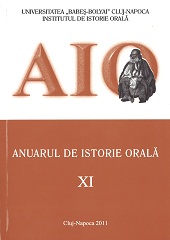MĂRTURII ORALE PRIVIND SITUAŢIA CULTURALĂ A ROMÂNILOR DIN BANATUL SÂRBESC ÎN ANII INSTAURĂRII REGIMULUI COMUNIST ÎN IUGOSLAVIA
Oral Testimonies of Romanian Cultural Environment in Serbian Banat in the Beginning of Communist Regime in Yugoslavia
Author(s): Mircea Măran, Aleksandra M. PetrovićSubject(s): History
Published by: Argonaut
Keywords: oral testimony, communism, minor comunity, oral sources
Summary/Abstract: There are around 40 settlements of Romanian national community in the Vojvodina Autonomous Region in the Western part of Banat, the former “historical Banat” that became a part of Yugoslav state after the First World War. According to the statistical data of inhabitants in 1948, the first registry after the Second World War, there were 57 000 Romanians who shared the destiny with the others during the times when Tito’s communist regime was gaining the power. Having in mind the connections that Romania had in the Second World War with Hitler’s Germany, Yugoslav Government did not trust the Romanian community. Transition to the new state governance was painful. The state’s repression of the upper middle class and rich people was not avoided by Romanian peasants. On the other hand, from the very beginning, new state governance was supported by the part of the Romanian intelligence, but also, the other social groups that found their interest to take over the better social positions. As far as the cultural activities are concerned, it was under the jurisdiction of the Romanian Cultural Society. Romanian Cultural Society was founded in 1945 for fulfilling the aims of Yugoslav cultural politics. From 1948 Association of Cultural and Educational activities of Vojvodina that was founded in the time of Informbiro overtook the jurisdiction of cultural activities. The first efforts were made in the last years to collect the data on cultural oral history of Romanian minority during the communist regime. The research that was done in Banat’s villages has indicated the wide spectrum of attitudes, emotions and memories concerning the transition to the socialism and the years when Communist Party of Yugoslavia was getting the power. The results showed that that people were adapting to the new conditions, accepting the reality. In this way, they became a part of the society,socialism that was a different model comparing with the societies in Romania and the other countries of socialistic governance.
Journal: Anuarul Institutului de Istorie Orală
- Issue Year: 2011
- Issue No: XI
- Page Range: 136-161
- Page Count: 26
- Language: Romanian

